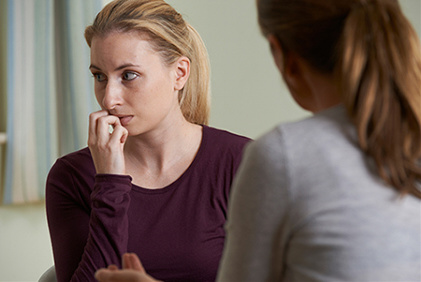Panic Disorder

Panic attacks can be brought on by a combination of factors such as family events, work and other major life events and counselling can help.
Panic Attacks
It is natural to experience unease, anxiety and panic. For someone with panic disorder these feelings are incredibly intense, occur on a regular basis and can arise at any given time and for no obvious reason. We understand this and can help you through this experience.
Panic disorder is an anxiety disorder characterised by recurring and regular panic attacks. A panic attack is an unexpected episode of intense fear and associated physical symptoms. Various other conditions can cause a lot of anxiety and could be related to panic attacks. Some of these include post-traumatic stress disorder (PTSD), general anxiety disorder (GAD) or phobias.
A severe panic attack can be an incredibly frightening experience and can lead to increased anxiety about suffering another one. They can strike without warning at any time, even during sleep. A person experiencing a panic attack may believe that he or she is having a heart attack or that death is imminent. The fear and terror that a person experiences during a panic attack is not in proportion to the true situation and may be unrelated to what is happening around them.
Symptoms of Panic Disorder
Most people with panic attacks experience several of the following symptoms:
- Racing heart
- Feeling weak, faint, or dizzy
- Tingling or numbness in the hands and fingers
- Sense of terror, of impending doom or death
- Feeling sweaty or having chills
- Sense of paranoia
- Chest pains
- Irrational fear
- Breathing difficulties
- Lacking confidence
- Feeling a loss of control
Panic attacks are generally brief, lasting less than ten minutes for most, although some of the symptoms may persist for a longer time. People who have had one panic attack are at greater risk of having subsequent panic attacks than those who have never experienced one.
Two forms of treatment can be used for panic attacks: medication or therapy. We provide Cognitive Behavioural Therapy (C.B.T.) via our specialist counsellors, although other talking therapies may also be helpful. Panic attacks can also be treated with anti-depressants and research has found that this combination can be very successful.
C.B.T. will give you contentment and happiness. It teaches methods whereby those who experience negative thoughts and stress can change them to positive thoughts feelings and behaviours with a new way of thinking with a lot less stress or panic.
Other self-help strategies include relaxation, regular exercise, positive visualisation with the aid of C.B.T., and learning not to struggle against the symptoms of a panic attack.

Treatment
Panic attacks can be brought on by family stress, work issues, and major lifestyle stressors. There is also some evidence that suggests that the tendency to develop panic disorder may run in families. People who suffer from panic disorder are also more likely than others to suffer from depression, to attempt suicide, or to abuse alcohol or drugs.
Luckily for sufferers of frequent panic attacks, panic disorder is a treatable condition. Psychotherapy and medications have both been used, either singly or in combination, for successful treatment. If medication is necessary, your doctor may prescribe anti-anxiety medications, antidepressants, or a class of heart medications known as beta blockers to help control the episodes.
Make an appointment with Counselling Cork Centre to help you get the contentment and happiness you deserve. Our counsellors are qualified and experienced. All locations are in private discrete premises, and you will be given full directions when you make an appointment. Please feel free to contact us to discuss any aspect of counselling, without any obligations.
Please call or email us now
Cork Counselling Centre
Telephone: 059 9171909
Mobile: 085 1600999
